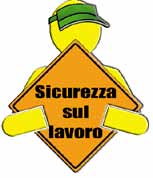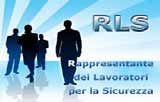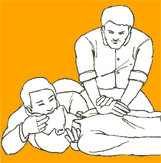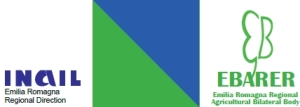Card 01.01 Firm figures and their tasks
THE RISKS:
- Lack of law knowledge
- Lack of other's rights respect
- Lack of one's self rights knowledge
It is necessary to remind that:
In "structured" farms there might be the presence of people with precise tasks which help making the work safer.
PRACTICAL AND OPERATING INDICATIONS:
A) Employer (DL): He/She is the one who takes decisions and spends money in the Farm (usually the Legal Representative/Chief Executive). He /she takes on the most difficult tasks to guarantee workers' safety and security in the Farm. The Employer is directly involved both in case of control by Security Bodies, such as Prevention Services (AUSL) from her employee has an accident at work. In Societies, it is necessary to formal identify only one partner as the sole safety responsible.
B) Health and Safety Officer (RSPP): He/She is the Employer's right-hand man/woman, and his/her work is identifying, evaluating and pointing out how safety can be improved to the Employer. In small Farms usually the Employer takes on the Health and Safety Officer role, after a 16 hours course. Nevertheless an external person or a worker could be named.
C) Company Physician (MC): He/She has the task to help the Employer to prevent "occupational diseases" which may create problems after a long period of time (for example: deafness, backache and plant protection product intoxication). Moreover workers have to visit the MC a first time for a certificate of eligibility, then periodically during the employment relationship. He/She is not a general practitioner, but a specialist who can be found in special Lists. The Company Physician must be informed about the risks, how the work is organized, the facilities, the farm production processes and the adopted preventive and protective measures.
D) Safety Workers Representative (RLS): He/She is elected by workers with internal vote and he/she is the spokesperson for workers' requirements about safety problems in the Farm. He/She must attend a 32 hours specific training course to acquire a complete knowledge of his/her duties. In case no one presents his/her candidature, a "Territorial" RLS is going to be elected in the future and will fulfil his/her duty in many Farms.
People in Charge of Emergency Procedures (AE): First aid and Fire fighting are performed by people chosen by the DL. They do what is reasonable/possible to avoid/limit damages and dangers whenever unforeseen events happen in the Farm, such as accidents, illnesses, fires and natural cataclysms. They shall follow each and every indication of the "Internal Emergency Plan" where there shall be written "who is in charge what he/she shall do how he/she shall do it". In small Farms (less than 5 workers) the DL is the only one who takes on these tasks. Specific training course must be attended however.
FURTHER INDICATIONS AND ADVICE
- Employer/workers shall remember to inform/enquire in a formal way (via form) about the names of the farm figures above.
- Employer/workers shall create/seek forms for the appointment and then make the names of the farm figures known to everyone.
- Employer/workers shall appoint/nominate people who are going to take on the tasks previously specified.
- Employer/workers shall attend/make sure people attend the compulsory courses for the role fulfilled.
- Employer shall keep certificates and make sure people attend refresher courses (every 3 years for the people in charge of First Aid)
- Employer shall keep informed on the compulsory updating and on the amendment of laws, that might be expected for the future.
- Keep in mind that the level and modality for the "health surveillance" (if necessary, also in presence of hazards that can lead to "occupational disease") will be different, depending on the number of days / year performed by each worker:
- A) if the annual work days carried out are 50/year or less, the employer may be limited to the employee to carry out a preventive medical examination, to be carried out from the Medical Officer or the Department of Prevention of ASL, which will issue appropriate certification and that will be valid for 2 years. Exceptions are cases where there is a clear and high exposure to specific risks; in this case it may fall in case B);
- B) if the days of annual work carried out are 51 or more, in addition to "visit suitability" will need to evaluate, every time, if need a "competent physician" company, that will carry out periodic visits in relation to some specific risks (especially chemical, noise, vibration, manual handling, repetitive movements) courses for the workers.





INSIGHTS: Collaboration for farm safety
Role and duties of three key figures: the Employer, the Health and Safety Officer and the Safety Workers Representative
Work safety norms contained in the Consolidating Act impose “safety” as a system inside the production process.
It is considered as a constitutive part of the company organization, indicating specific duties for both employer and workers.
The Consolidating Act outlines a real organizational model addressed to the systematic individuation and elimination or reduction of risk factors in working places.
This organizational model outlined by law constitutes a duty, and the Employer him/herself is responsible for its realization
Nevertheless, the success of the organizational model depends on several people’s ability to cooperate
together, respecting each other’s roles and functions besides following the regulations.
The key figures of the farm safety system are the Employer, the Health and Safety Officer (RSPP) and the
Safety Workers Representative (RLS).
Employer and RSPP
RSPP must be chosen by the Employer.
He/she shall possess specific professional requisites indicated by the law. He/she shall be a person already employed in the farm,
such as a worker, who has the right qualifications for this task. If inside the farm no-one wants to assume this role, it is
compulsory to choose an external advisor.
In agricultural holdings and breeding farms with up to 30 workers (law indicates how to calculate them, even taking into
account seasonal labourers), the Employer shall take on the RSPP role after attending specific training and information courses.
The RLS shall be informed in advance. RSPP’s tasks are particularly important, and he/she shall guarantee the Health and Safety System provides:
a) individuation of risk factors, risks evaluation and introduction of working places safety and healthy measures according
to the regulations on the basis of the company organisation specific knowledge;
b) implement, as far as it falls within his/her competence, preventative and protective measures provided for by the law and their control systems;
c) establishing safety procedures for each company activity;
d) developing information and training programmes for workers;
e) taking part to meetings on safety and health at work;
f) taking part to regular meetings, called by the Employer, together with the Company Physician and the RLS (this
meeting is compulsory once in a year in companies with more than 15 employees)
g) inform workers on:
- general risks of the farm activities and specific risks of every operator’s task;
- first aid, fire fighting and work places evacuation procedures;
- names of the Officer, the people in charge of safety and health service and the Company Physician;
- adopted prevention and protective measures and activities.
Workers and their Representative (RLS)
Laws provide duties even for workers.They shall:
- follow any given safety disposition;
- correctly use working equipment and P.P.E. provided by the Employer (helmets, gloves, boots, earmuffs and the like);
- immediately report to both the Employer and the RLS any machinery and substances problem, as well as any hazardous condition they happen to know;
- join any information and training courses organized by the Employer.
These tasks are so fundamental, that providing workers with a reference point - the Health and Safety Officer, or RLS - was a direct consequence. RLS shall be consulted on:
- risks evaluation (beforehand, and he/she will receive a copy);
- RSPP nomination
- training organisation and prevention programmes;
- nominations of people in charge of prevention service;
- worker’s information programme;
- any prevention service that shall be performed.
RLS shall appeal to competent authorities against preventative measures and risk protections in the farm which he/she thinks are unsuitable.
RLS has an autonomous proposal power, and he/she shall take specific training courses. To the RLS time shall be guaranteed to carry out his/her tasks without loosing salary as well as necessary means to fulfil his/her duties.
RLS, RSPP and person in charge of prevention and protection service are incompatible offices.
Company RLS
Any company shall choose its RLS. Usually he/she is elected during the “national safety and health at work day” (this day has not been chosen yet).
Laws distinguish between companies with a maximum of 15 workers and others, referring to collective bargaining however (even for working time payment and working tools).
In companies up to 15 workers, RLS is usually directly chosen by operators among themselves.
In companies which comprehend more than 15 workers, RLS is elected by operators among trade-union representations. He/she will be directly
chosen by operators among themselves only if there is any trade-union representation.
Territorial RLS
If a company does not choose its RLS, his/her duties are fulfilled by a Territorial RLS (RLST), save different agreement
between worker’s trade-union association and employer’s one which are the most representative at national level.
In that case, the company takes part, upon membership fee, in a proper Found – constituted at INAIL – whose resources,
not less than 50%, are destined to finance TRLS activities, even their specific training courses.
Finally, the RLST is incompatible office with other operating trade-union functions.

